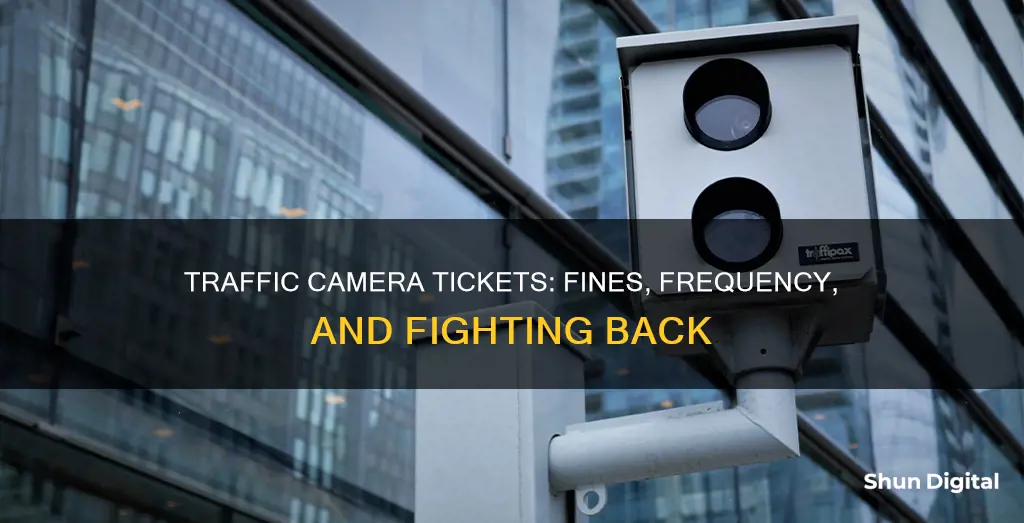
Getting a ticket from a speeding or red light camera can be a shock, especially when you have to pay a fine. But will it lead to higher insurance rates? The short answer is no. In most states, camera tickets are treated like non-moving violations, similar to parking tickets or those issued for an expired registration. They often won't go on your driving record and won't impact your insurance rates. However, there are exceptions in Arizona, California, and Oregon, where camera tickets can lead to points on your license and higher insurance rates.
| Characteristics | Values |
|---|---|
| How often do camera tickets increase? | Camera tickets do not directly increase insurance premiums. |
| How does a camera ticket affect insurance? | Camera tickets are treated like non-moving violations in most states and are not added to driving records. |
| What are the exceptions? | Arizona, California, and Oregon treat camera tickets as moving violations, which can increase insurance rates. |
| What are the other consequences of camera tickets? | Camera tickets result in fines, victim surcharge fees, and court fees. |
| Can you fight a camera ticket? | Yes, you can fight a camera ticket in court, but it may not be worth the effort or cost as it doesn't affect your insurance or driving record. |
What You'll Learn
- Camera tickets don't increase insurance rates in most US states
- Camera tickets are treated like non-moving violations in most US states
- Camera tickets don't add points to your driver's license in most places
- Camera tickets are issued to the registered owner of the vehicle
- Camera tickets are no different from regular speeding tickets in some US states

Camera tickets don't increase insurance rates in most US states
Receiving a ticket for speeding or running a red light can be a shock, especially if it comes in the mail from an automated camera. Not only do you have to pay a fine, but you may also have to pay more for your car insurance.
However, in most US states, camera tickets do not increase insurance rates. This is because "automated enforcement citations are generally civil or administrative violations that do not result in points and are not made part of the driver's record," according to the Insurance Institute for Highway Safety (IIHS).
Most states treat camera tickets as non-moving violations, similar to parking tickets, tickets for expired registration, or broken tail lights. Non-moving violations do not typically affect insurance rates.
However, there are a few exceptions. In Arizona, California, and Oregon, camera tickets are treated as moving violations, and can result in points on your driver's license and higher insurance rates. In Oregon, a red light camera ticket is considered a Class B traffic violation. In Arizona, drivers receive two points for red light camera violations and three points for speeding camera violations. California gives drivers one point for red light camera infractions.
It's important to note that even in states where camera tickets are not treated as moving violations, multiple speeding tickets or a single significant speeding ticket may still increase your insurance rates.
Charging the 808 Camera: Long First Charge Needed?
You may want to see also

Camera tickets are treated like non-moving violations in most US states
Camera tickets are typically treated as non-moving violations in the majority of US states. This means that they are viewed in the same way as parking tickets or tickets issued for an expired registration or a broken tail light. In other words, they are seen as civil citations that do not carry any points and are not added to your driving record. As a result, these types of tickets will not cause your car insurance rates to increase.
However, it's important to note that there are a few exceptions to this rule. Currently, only three states—Oregon, Arizona, and California—treat photo tickets as moving violations. In these states, a camera ticket is considered equivalent to a ticket issued by a police officer for running a red light or speeding. Consequently, these tickets can result in points being added to your driver's license, and they may also lead to an increase in your insurance premiums.
In most cases, a camera ticket will result in a fine that you must pay. The cost of the fine will depend on the jurisdiction and the severity of the infraction. Additionally, there may be other fees associated with the ticket, such as a victim surcharge fee and court fees. It's important to note that even though a camera ticket may not affect your insurance rates, it can still impact your driving record if the state you live in treats it as a moving violation.
While you can choose to fight a camera ticket, it's generally not worth the effort unless you believe it will impact your insurance rates or driving record. If you do decide to contest the ticket, you can request proof of the violation, such as the photo or video footage, and review it to ensure that it clearly shows you, your vehicle, and your license plate. Additionally, if you had a valid reason for breaking the law, such as an emergency or avoiding an accident, be sure to explain this to the judge, as it may lead to a dismissal of the charges.
In summary, camera tickets are usually treated as non-moving violations in most US states, resulting in a fine with no impact on insurance rates or driving records. However, it's important to be aware of the specific laws and regulations in your state, as there are exceptions where camera tickets are treated as moving violations and can have more significant consequences.
Understanding Camera Raw: Unlocking Photography's Full Potential
You may want to see also

Camera tickets don't add points to your driver's license in most places
In most places, camera tickets are treated like non-moving violations, similar to parking tickets, or tickets issued for an expired registration or a broken taillight. This means that they do not add points to your driver's license.
However, there are some exceptions. In the US, fifteen states currently have red light or speeding cameras, and three of these—Arizona, California, and Oregon—treat camera tickets as moving violations. This means that receiving a camera ticket in these states may result in points being added to your driver's license.
It's important to note that even if a camera ticket does not result in points, it may still impact your car insurance rates. While most states do not increase insurance rates based on camera tickets, it's always a good idea to review the specific laws and regulations in your state to understand the potential consequences.
In summary, while camera tickets generally do not add points to your driver's license, there are a few exceptions, and it's important to be aware of the laws and regulations in your specific location.
Charging the XP Waterproof Camera: A Step-by-Step Guide
You may want to see also

Camera tickets are issued to the registered owner of the vehicle
Camera tickets are typically issued to the registered owner of the vehicle, based on the licence plate number. This is because, in most cases, the cameras cannot identify who was driving the vehicle at the time of the violation. However, there are some exceptions. For example, in Seattle, companies or organisations cannot file a declaration of non-responsibility; a vehicle driven by an employee is considered to be in the "care, custody, and control" of the registered owner or employer.
The process for issuing camera tickets varies depending on the jurisdiction. In some cases, a local or provincial law enforcement agency will review the image and ticket before sending a copy to the registered owner. In other cases, the ticket may be sent directly to the registered owner.
It's important to note that camera tickets are not treated the same as traditional tickets. In most states, camera tickets are considered non-moving violations, similar to parking tickets, and will not appear on your driving record or affect your insurance rates. However, there are a few states and cities, such as Arizona, California, and Oregon, where camera tickets are treated as moving violations and can result in points on your license and increases in your insurance premiums.
If you receive a camera ticket, you usually have the option to pay the fine, dispute the ticket, or request a hearing. Ignoring the ticket is generally not a good idea, as the fine will increase, and it may negatively affect your driving record and result in additional fees and legal consequences.
The First Camera Phone: A Revolutionary Invention
You may want to see also

Camera tickets are no different from regular speeding tickets in some US states
The use of speed and red-light cameras to enforce traffic laws is a highly controversial practice in the US. While many states use these traffic cameras, some states prohibit their use altogether.
In some states, camera-issued tickets won't lead to traffic violation demerit points, whereas an officer-issued ticket for the same violation does result in points. However, in three states—Arizona, California, and Oregon—camera tickets are treated the same as regular speeding tickets, and can result in points on your license.
In most states, camera tickets are treated like non-moving violations, meaning they are on the same level as parking tickets or tickets for an expired registration. This is because it is often not possible to identify the driver of the vehicle from the photo, so the ticket is issued to the registered owner of the vehicle.
However, in Arizona, California, and Oregon, camera tickets are treated as moving violations, which can result in points, a mark on your driving record, and increased insurance premiums.
It's important to note that the laws regarding the use of traffic cameras and the penalties for camera-issued tickets can vary from state to state and may change over time. Therefore, it's always a good idea to consult a local traffic attorney or check your state's specific laws if you have received a camera ticket.
LCD Mode: YI Action Camera's Secret Weapon
You may want to see also
Frequently asked questions
Camera tickets generally do not increase insurance rates as they are not added to your driving history. However, in the states of Arizona, California, and Oregon, camera tickets are treated as moving violations and can increase insurance rates.
Camera tickets are issued to the registered owner of the vehicle based on the license plate in the photo, whereas regular speeding tickets are issued to the driver of the vehicle. Camera tickets also do not result in demerit points, while speeding tickets can result in demerit points and an increase in insurance rates.
The main penalty for a camera speeding ticket is a fine, which is determined by how much you exceeded the speed limit and the location of the offense. There may also be additional fees such as a victim surcharge fee and court fees.
If you don't pay a camera speeding ticket, the fine will be added to your vehicle license, and you will be required to pay it when you renew your license plate. Failure to pay the fine may result in the suspension of your driver's license.







